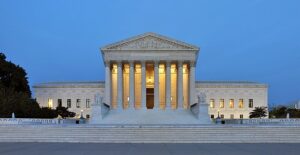With one week left in 2023, it’s time for our annual discussion of the big events of the year and what we think might be remembered by historians decades, even centuries, hence. In many ways 2023 has teetered on the precipice of momentous events, some of which we’ve already discussed here on Concerning History. The rapid evolution and use of Artificial Intelligence has continued to make headlines, and conflict in the Middle East between Israel and Hamas has reached a new fever pitch. Here are some other important events and trends of the year just past that our staff suspects may be the talk of historians in years to come.
BC: The past few decades have seen all sides of the political aisle invest increasing importance in the role of the United States Supreme Court, but in 2023 the prestige and supposed impartiality of the highest court in the land has suffered body blows that go beyond simply the hyper-partisan efforts to secure appointments. We had already known of the role of Justice Clarence Thomas’s wife in contesting the 2020 election–and his dubious decision not to recuse himself from cases concerning those efforts–but this year the dam broke on Thomas’s own previously-undisclosed financial dealings with multiple wealthy conservative donors. And this was just the tip of the iceberg: reports soon surfaced linking five other justices (Roberts, Kavanaugh, Gorsuch, Alito, and liberal Sotomayor) with ethically questionable social and financial dealings, making fully two thirds of the highest court in the land compromised.
When confronted with these stories, the justices closed ranks, individually offering excuses that, if taken at face value, seem to ask us to replace our ethical qualms with questions of these legal scholars’ basic intelligence. Collectively, the court finally issued a statement on self-policed ethics that essentially amounted to a call for the foxes to guard the chicken coop. With the looming 2024 election holding serious stakes for democracy in the United States (and already beginning to appear in various ways on court dockets), I can only hope that in future years these events are recognized as just an element in the growing disillusionment with and eventual major reform of the Supreme Court, rather than one more step in the crumbling of our grand American experiment.

HC: The 2020s ushered in what some have called the second or digital Gilded Age, and parallels to the nineteenth-century era don’t stop coming. It’s there in the creep of monopolies into every corner of our lives. It’s in the sluggish government efforts to combat that creep. It’s in the widening and dehumanizing disparity of wealth. It’s in the casual daily forms of xenophobia. Not to get too purple of prose here, but some days it feels like the United States is in a battle for its very soul.
For 2023, the main Gilded Age theme was the strike. Cost of living is high, wages and working conditions are poor, and workers are angry. Since 1935’s National Labor Relations Act, US federal legislation has protected the right of Americans to collectively bargain and strike. And, boy, did workers exercise that right this year. United Auto Workers, Starbucks, and Kaiser Permanente employees all made their voices heard. The Writers Guild of America and SAG-AFTRA brought big-studio TV and filmmaking to a screeching halt for nearly four months. And the annual Make Amazon Pay strike that fell over Black Friday wrapped around the world, with workers from at least 30 countries participating. It certainly feels like a labor rights movement is simmering, and hopefully coming decades see this as the opening salvos in a new battle for fair compensation in the twenty-first century rather than a blip in an ongoing pattern of social stratification.
FB: The Fourteenth Amendment is most famously known for its guarantee of the equal protection of the law, the right to due process for all citizens, and its extension of federal citizenship to all persons born in the U.S. There is, however, another clause in the Fourteenth Amendment that have become relevant this year, more than one hundred and fifty years since they were written: that denying public office to anyone who engages in insurrection against the U.S. government. 2023 has seen several states’ Supreme Courts hear cases to determine whether former President Donald Trump can appear on these states’ ballots in 2024 after he incited a mob to attack Congress to stop the certification of Joe Biden’s 2020 election victory. This past week, the Supreme Court of Colorado, one of the few non-partisan state Supreme Courts, ruled that Trump was, in fact, ineligible to appear on its ballots due to the Fourteenth Amendment. Predictably, the Trump Campaign appealed this decision, blasting it as an anti-democratic ploy to deprive Trump of a third chance at the presidency and further proof of some vast government conspiracy against him.
This debate about the Fourteenth Amendment presents American democracy with another stress test. While there is certainly an argument that the Fourteenth Amendment disqualifies Trump because of his actions on January 6, 2021, others point out that such a decision would come at a time when Americans’ respect for such court decisions is at a historic low, and that the healthiest way for our democracy to move forward from Trump’s fascist aspirations is to soundly reject him at the ballot box. As we enter another fraught presidential election year in 2024 upon which the fate of American democracy seems to hang, it is hard to imagine these suits not holding some importance for future historians, whatever the fate of the American Experiment in coming decades.


